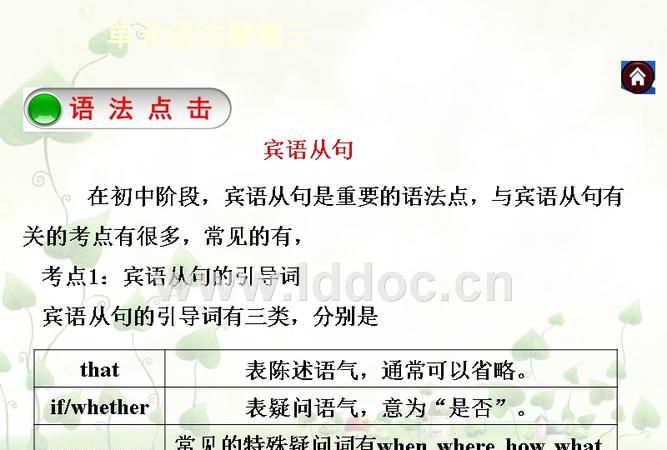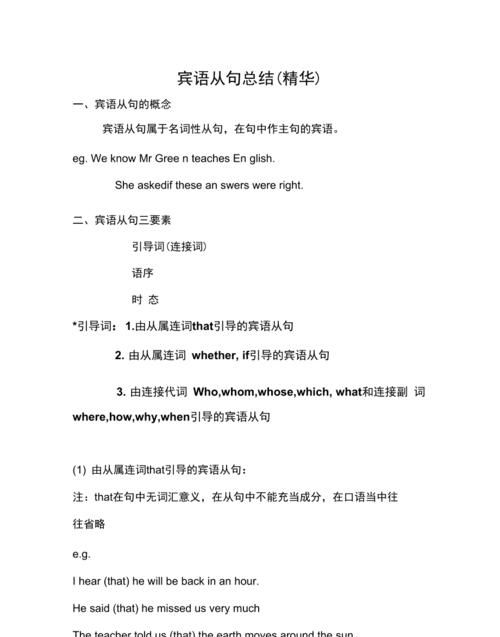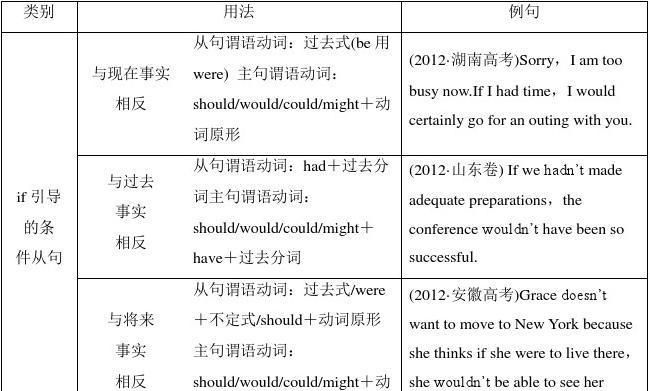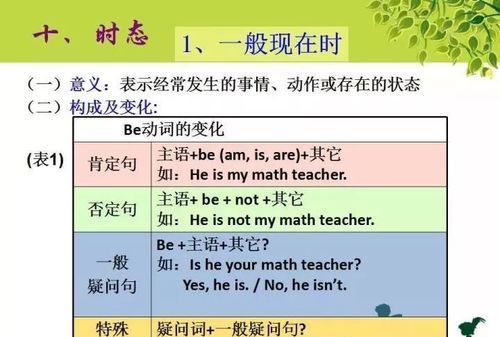本文目录
宾语从句的用法归纳总结
宾语从句英语语法
宾语从句(一)
在复合句中用作宾语的从句叫做宾语从句。宾语从句是初中英语中最重要的一种从句,它内容完整,句型结构较为复杂,主句和从句时态搭配要求严格,在中考试题中频频出现。而且学好宾语从句也可为到高中学习间接引语、主语从句、表语从句及同位语从句打下良好的基础。
宾语从句常由that引导,在口语中常省略。当主句中谓语动词是现在或将来时态时,从句中谓语动词不受主句中谓语动词时态的影响,按需要可以使用任何时态。如:
She says (that) she works from Monday to Friday. 她说她从周一至周五上班。(从句是一般现在时)
She says (that) she will leave a message on his desk. 她说她要在他桌子上留个便条。(从句是一般将来时)
She says (that) she has never been to Mount Emei. 她说她从来没有去过峨眉山。(从句是现在完成时)
当主句谓语是过去时态,从句中的时态一般用表示过去的某种时态。如:
He said there were no classes yesterday afternoon. 他说昨天下午没有课。(从句是一般过去时)
He said (that) he was going to take care of the baby. 他说他会去照看这个婴儿。(从句是过去将来时)
He said (that) they were having a meeting at that time. 他说他们那时正在开会。(从句是过去进行时)
当主句谓语是过去时态,而宾语从句叙述某一客观真理(事实)时,宾语从句的时态则用一般现在时。如:
The teacher told us(that) nothing is difficult if you put your heart into it.
老师告诉我们世上无难事只怕有心人。
She said (that) her father is twenty-eight years older than her.她说她父亲比她大二十八岁He said that light travels much faster than sound. 他说光传播比声音传播快得多。
宾语从句(二)
由连接代词或连接副词引导的宾语从句。
引出名词性从句的连词whether和if,在引出宾语从句时,用法和意义相同。但是只能引出宾语从句和不在句首的主语从句,而whether除了引出宾语从句外,还可引出主语从句、表语从句和同位语从句。
例如:We don't know whether (if) it is right. 我们不知道它是否正确。
he question is whether she should do that. 问题在于她是否应该做那件事。
Whether it is true remains a question. 是真是假还是个问题。
试比较:
当if从句处在主句之后作“是否”讲时,引出的是宾语从句。例如:
I don't know if it is true. 我不知道这事是否真实。
当if从句在主句之前作“如果”讲,则引出状语从句。例如:
I shall go there if I have time. 如果我有时间,我将到那儿去。
初中英语宾语从句小结
一、当由陈述句充当宾语从句时,用that引导,that无词义,在口语或非正式文体中常省略。如:
She said that she would leave the message on the headmaster's desk.她说她会把留言条放在校长桌子上。
He said that he could finish his work before supper.他说他会在晚饭前完成工作
二、当由一般疑问句充当宾语从句时,用if或whether引导,意为“是否”。如:
Alice wanted to know if/whether her grandmother liked the bag.爱丽斯想知道她祖母是否喜欢这个包。 I don't know whether he'll come the day after tomorrow.我不知道他后天是否会来
但直接与or not连用时,往往用whether(if…or not也可以使用)。如:
Let me know whether / if he will come or not.(= Let me know whether or not he will come )让我知道他是否能来。
I don't know whether / if he does any washing or not.(= I don't know whether or not he does any washing. )我不知道他在家洗不洗衣服。
I wonder whether we stay or whether we go.我想知道我们是去还是留。
三、如果宾语从句原来是特殊疑问句,只需用原来的疑问词引导。如:
Could you tell me where we will have the meeting this afternoon?你能告诉我我们今天下午将在哪儿开会吗?
I don't know who bought the present for me. Is it Jack?我不知道谁给我买了礼物。是杰克吗?
下面的表格可以帮助大家理解这一部分内容
句式
连词
语序
陈述句
that
不变
一般疑问句
If/whether
改为陈述语序
特殊疑问句
特殊疑问词
改为陈述语序
宾语从句的时态问题
主句
一般现在时态
一般过去时态
从句
保留原来时态
改为过去的某个时态
客观事实和自然现象除外
所谓过去的某个时态指的是如下的变化
一般现在时态
一般过去时态
现在进行时态
过去进行时态(was/were doing)
现在完成时态
过去完成时态(had +过去分词)
一般将来时态
过去将来时态(would do;was/were going to do)
宾语从句使用--四注意
我们在学习和运用宾语从句时,应该注意以下四点:
一、引导词的使用
1. 当宾语从句由陈述句变化而来时,用that来引导从句,that常无具体意义,一般可省略。例如:
Lin Tao thought(that)the TV play was very boring.
2. 当宾语从句是由一般疑问句变化而来时,要用if或whether来引导从句。例如:
David asked his mother if/ whether she liked the dinner last night.
3. 当宾语从句是由特殊疑问句变化而来时,原句中的疑问词充当连接代词(如who, whose, what, which)或连接副词(如when, where, why, how),引导宾语从句。例如:
Do you know what we can do on the island?
I don’t know why Jane was late for school this morning.
二、语序的陈述化
宾语从句一般要用陈述句语序。例如:
When did he leave? I want to know. →I want to know when he left.
Does the shop close at six every day? Do you know? →Do you know if/ whether the shop closes at six every day?
三、时态的呼应
1. 如果主句是一般现在时、一般将来时或祈使句时,宾语从句可根据情况使用各种时态。例如:
I hear she is here today(she was here yesterday/ she will be here tomorrow.)
2. 如果主句是一般过去时,宾语从句应使用过去时态的某种形式。例如:
He said he was watching TV(he had swept the floor/ he would play football after school)。
3. 如宾语从句所叙述的是客观事实、自然现象或科学真理等,从句不受主句时态限制,仍用一般现在时。例如: Our teacher told us that light travels faster than sound.
四、否定转移
当主句的谓语动词为think, believe, suppose等动词,且主语为第一人称时,从句的否定要转移到主句上。例如:
I don’t believe he is here on time, is he?
I don’t think Tom is the best student in his class, is he?
宾语从句要点盘点
一、宾语从句的语序必须是陈述语序。如:�
Do you know why winter is colder than summer?你知道为什么冬季比夏季冷吗?�
二、宾语从句与主句的时态要相互呼应。�
主句是现在或将来时态时,从句可用任何所需要的时态。主句是过去时态时,从句要用表示过去的相应的时态。但如果从句中有明确表示过去的时间状语,则从句应用一般过去时,不用过去完成时;如从句表达的是客观规律或真理时,用一般现在时。如:�
He said he had finished his studies when the war broke out.他说战争爆发时,他已经完成了学业。
He said he would spend his holiday in Dalian.他说他将在大连度假。�
She said that the earth moves around the sun.她说地球围绕太阳转。�
三、如宾语从句有自己的宾语补足语,则用it作形式宾语,而把宾语从句后置。其句型为:“主语+谓语+it+补足语+宾语从句”。如:
We think it important that we should master at least one foreign language.
我们认为掌握至少一门外语是重要的。�
注意:
(1)连词that引导的名词性从句很少作介词的宾语,只用在except,but和in等少数几个介词后。其它一些介词的宾语从句如由连词that引导,则需用it先行一步,作形式宾语。如:
He is a good student except that he is careless.他是个好学生,只不过有点粗心。�
See to it that children don’t catch cold.当心孩子别感冒了。�
(2)that引导表语从句时,在句中无词义,只起连接作用,但不可省去。His idea is that we should go there at once.他主张我们立即去那儿。�
四、连词whether可引导主语从句、宾语从句和表语从句,不可省。if引导宾语从句。
(1)宾语从句是肯定句时,whether,if可互换;但whether常和or not连用,宾语从句是否定句时,一般用if引导。如:�
I don’t know if/whether I should tell you.不知我是否应告诉你。�
I wonder whether it is true or not.不知这是不是真的。�
I don’t care if it doesn’t rain.天下不下雨我不会在乎。�
(2)作介词宾语时,只能用whether,不能用if。如:�
Everything depends on whether we have enough experience.一切都取决于我们是否有足够的经验。
五、that引导宾语从句时不可省的几种情况:�
1.that宾语从句的状语部分位于从句前部时。�
I promised that if anyone could set me free,I would make him king over the earth.
我曾许诺如果有人把我放了,我就让他成为全世界的国王。�
2.当主句的状语部分位于that宾语从句前时。�
Abraham Lincoln later said himself that he only went to school a little now and a little then.
亚伯拉罕•林肯自己后来说他只不过是时断时续地接受教育。�
3.主句的谓语动词与宾语从句之间有插入语时。�
When he got to England,he found,however,that his English was too limited.
然而当他到英国时,他发现他的英语很有限。�
4.当一个谓语动词带两个或两个以上的that引导的宾语从句时。
Then he said that French was the most beautiful tongue in the world,and that we must keep it among us and never forget it.
他说,法语是世界上最美的语言,我们必须坚持说法语,永远也不要忘记它。�
5.宾语从句是双宾语中的直接宾语时。�
I must never tell anyone that I could not see the cloth.
我决不能告诉任何人我看不到那布。�
6.宾语从句的主语是this/that,或用this/that修饰主语时。�
He said that that was a good idea.他说那是个好主意。�
7.在直接引语中,主句和宾语从句被隔开时。�
“I’m sorry to tell you,”he said,“that you didn’t watch carefully enough what I did.”
我很遗憾的告诉大家,你们没有仔细观察我所做的一切。�
8.宾语从句的主语是非谓语动词或主语从句时。�
The old lady then explained that what she was looking for was a pair of gloves for a girl.
那位老太太解释说她在为一个女孩找一双手套。

宾语从句中的动词和主语从句中的谓语动词
时态受影响,保持一致
语态不受影响,语态与从句主语有关

宾语从句的知识点总结
动词后面接宾语从句,名词后面接定语从句宾语从句放在动词(及物动词或者系动词)后面作它的宾语,定语从句放在名词前面或后面作为它的定语。宾语从句
在句子中起宾语作用的从句叫做宾语从句.宾语从句分为三类:动词的宾语从句,介词的宾语从句和形容词的宾语从句.
1.宾语从句的连接词
从属连词
连接宾语从句的从属连词主要有that,if,whether.
that引导表示陈述句的宾语从句,而if和whether引导表示“是否”的宾语从句.
He told that he would go to the college the next year
他告诉我他下一年上大学.
I don’t know if there will be a bus any more.
我不知道是否还会有公交车.
Nobody knew whether he could pass the exam.
没人知道他是否会通过考试.
连接代词
连接代词主要有who, whom ,whose ,what ,whoever ,whomever ,whosever, whatever, whichever等.
连接代词一般指疑问,但what, whatever除了指疑问外,也可以指陈述.
Do you know who has won Red Alert game?
你知道谁赢了这一局红警游戏吗?
I don’t know whom you should depend on.
我不知道你该依靠谁.
The book will show you what the best CEOs know.
这本书会告诉你最好的执行总裁该了解些什么.
Have you determined whichever you should buy,a Motorola or Nokia cell phone?
你决定好是买诺基亚还是摩托罗拉的电话了吗?
连接副词
连接副词主要有when,where,why,how,whenever,wherever,however等.
He didn’t tell me when we should meet again.
他没有告诉我什么时候我们能再见面.
Could you please tell me how you read the new panel?
你能展示给我怎么用这个新的操作盘吗?
None of us knows where these new parts can be bought.
没有人知道这些的新的零件能在哪里买到.
2.动词的宾语从句
大多数动词都可以带宾语从句
We all expect that they will win , for members of their team are stronger.
我们都预料他们会赢,因为他们的队员更强壮.
He told us that they would help us though the whole work.
他告诉我们在整个工作中,他都会帮忙的.
部分“动词+副词”结构也可以带宾语从句
I have found out that all the tickets for the concert have been sold out.
我发现这场音乐会的所有票都买光了.
Can you work out how much we will spend during the trip?
你能计算出这次旅行我们将花费多少钱吗?
动词短语也可以带宾语从句
常见的这些词有:
make sure确保 make up one’s mind下决心 keep in mind牢记
Make sure that there are no mistakes in your papers before you turn them in.
在上交试卷前确保没有任何错误.
可运用形式宾语it代替的宾语从句
①动词find,feel,consider,make,believe等后面有宾语补足语的时候,则需要用it做形式宾语而将that宾语从句后置.
I think it necessary that we take plenty of hot water every day .
我认为每天多喝开水是有必要的.
I feel it a pity that I haven’t been to the get-together.
我没去聚会,感觉非常遗憾.
I have made it a rule that I keep diaries.
我每天写日记成了习惯.
We all find it important that we (should) make a quick decision about this mater.
我们都认为对这件事马上做出决定很重要.
②有些动词带宾语从句时寻要在宾语与从句前加it
这类动词主要有:hate, take , owe, have, see to.
I hate it when they with their mouths full of food.
我讨厌他们满嘴食物时说话.
He will have it that our plan is really practical.
他会认为我们的计划确实可行.
I take it that you will agree with us.
我们认为你会同意我们的.
When you start the engine, you must see to it that car is it neutral.
开启发动机时, 一定要使汽车的离合器处于空挡位置.
③若宾语从句是wh-类,则不可用it代替
We all consider what you said to be unbelievable.
我们都认为你所说的是不可信的.
We discovered what we had learned to be valuable.
我们发现我们所学到的东西都是有用的.
3.介词的宾语从句
用wh-类的介词宾语从句
We are talking about whether we amdit students into our club.
我们正在讨论是否让学生加入我们的俱乐部.
The new book is about how Shenzhou 6 manned spaceship was sent up into space.
这本新书是关于神州6号载人航天飞船是如何升如太空的.
用that,if引导的介词宾语从句
有时候except,but,besides三个介词后可见到that引导的宾语从句
I know nothing about my new neighbor except that he used to work with a company.
对于我的新邻居我只知道他曾在一家公司上班,其他一无所知.
4.形容词的宾语从句
常用来引导宾语从句的形容词有: sure,certain,glad,please,happy,sorry,afraid,satisfied,surprised
I am sure I will pass the exam.
我确信我会通过考试.
I am sorry that I have troubled you so long.
很抱歉我这么长时间在打扰你.
He is glad that Li Ming went to see him when he was ill.
他很高兴在他生病的时候李明能去看望他.
5.if,wheter在宾语从句中的区别
①if和whether在作“是否”解时,引导宾语从句常放在动词know,ask,care,wonder,find out等之后,介词后一般不用if
②少数动词,如:leave,put,discuss,doubt后的宾语从句常用whether.
③whether后可以加or not,但是if不可以.
④在不定式前只能用whether.
⑤避免歧异时,我们常用whether而不用if.
6.哪些宾语从句不可以省略引导词that
当that作learn,suggest,explain,agree,wonder,prove,mean,state,feel,hold等动词的宾语时;
当宾语从句较长时;
当主语状语置于主句尾,宾语从句之前时;
当主语谓语动词(包括非谓语动词)与宾语从句之间有插入语时;
当一个动词带有两个或两个以上宾语从句时,此时第一个that可以省略,第二个that不可以省略;
当宾语从句中的主语是this,that或this,that做主语的定语时;
当宾语从句是双宾语中的直接宾语时;
当宾语从句的主语是非谓语动词或主语从句时;
当主语中的谓语动词是固定词组时;
当宾语从句有it做其先行词时;
在直接引语中,转述分句把宾语从句隔开时.
7.宾语从句的否定转移
主句是谓语动词是think,believe,imagine,suppose,consider,espect,fancy,guess等,并且主句的主语是第一人称而且为一般现在时,从句的否定词一般要转移到主句上来,其反义疑问句一般与宾语从句一致.
I don’t think he will come to my party.而不能说成I think he won’t come to my party.
我认为他不会来我的舞会.
I don’t believe that man is killed by Jim,is he?
我认为那个人不是Jim所杀的,是不是?
如果宾语从句中有某个含有否定意义的形容词或副词,其反义疑问句要用肯定形式.
We find that he never listens to the teacher carefully,does he?
我们发现他从来不仔细听老师讲课,是不是?
8.宾语从句的时态和语序
当主句为现在时或将来时的时候,宾语从句的时候一般不受主句的时态所影响.
当主句为过去时的时候
①从句用一般过去时或过去进行时表示与主句谓语动词动作同时发生
I only knew he was studying in a western country,but I didn’t know what country he was in.
我只知道他当时在西方的一个国家读书,可不知道是哪个国家.
He asked me if I was reading the story The Old Man and the Sea when he was in.
他问我他进来的时候我是否在读<老人与海>.
②从句过去完成时表示该动作发生在主句谓语动作之前
He told me that he had told Mary about the meeting already.
他告诉我他已经把有关会议的事情告诉的了Mary.
③从句谓语用过去将来时表示该动作发生在主句谓语动作之后
The reporter asked if the government would take necessary measures to put down the to-do.
记者问政府是否会采取必要的措施镇压骚乱.
如果从句是一个客观真理,那么从句的时候不根据主句的时态而变化
The teacher said that the moon goes around the earth yesterday.
老师昨天说月亮绕着地球转.
当宾语从句的引导词是who,which,what,when,where,how,why等表疑问时,不能按正常语序安排,经常将这类引导词置于句首
Who do you think the public might choose as their favorite singer this year?
你认为今年公众会选谁为他们最喜欢的歌手.

宾语重句的详细资料有哪些
1.宾语从句在句中作及物动词或介词的宾语,从句放在主句之后,前后不用逗号分开。
2.引导宾语从句的词有:
连词that(在口语中that常可省略),if, whether,如:
He knows that Jim will work hard.
连接代词who, whom, which等,如:
Do you know who (whom) they are waiting for?
连接副词when, where, how, why等,如:Could you tell me how we can get to the station?
3.whether和if都有“是否”的意思,一般情况下两者可以换用,但在介词之后,
不定式之前,与or not连用,在句首或在引导表语从句,同位语从句时,只能用whether,如:I want to know if/whether the news is true. He doesn't know whether to stay or not?
4.宾语从句要用陈述句语序。
5.宾语从句一定要注意时态呼应,即:当主句谓语动词是过去式时,从句中谓语动
词也要用过去范畴的时态,但若从句陈述的是真理或客观规律,其谓语的时态仍用一般现在时,如:
He asked who could answer the question.
My father told me that the earth goes around the sun.
6.一个宾语从句只能用一个连词。
7.当主句谓语动词是think, believe等动词时,宾语从句的否定意义要放到主句中。另外,当主句主语为第一人称时,后面若接附加疑问句,那么附加疑问句的主语、谓语应与从句中的主谓语保持一致。如:
I don't think he looks like his father, does he?
8.直接引语和间接引语也是宾语从句,直接引语是引述别人的原话,放在引号内,
不用连词联接;间接引语是用自己的话转述别人的话,通常用连接词与主句联接。
(1)陈述句变为以that引导的宾语从句,如:
He said,“I'm happy.”[FY()[FY]]He said that he was happy.
(2)一般疑问句变为if(whether)引导的宾语从句,如:
He asked me,“Does his father know Mr Green?”
---He asked me if his father knew Mr Green.
(3)特殊疑问句变为由who, what, where, how等疑问词(连接代词或连接副词)引导的宾语从句,如:
He asked me,“Where is Mr Wang?”
---He asked me where Mr Wang was.
注意上述例句中连词、时态、语序等变化。
宾语从句
【常见用法:】
常由that引导,在口语中常省略。当主句中谓语动词是现在或将来时态时,从句中谓语动词不受主句中谓语动词时态的影响,按需要可以使用任何时态。
当主句谓语是过去时态,而宾语从句叙述某一客观真理(事实)时,宾语从句的时态则用一般现在时。
有连接
引出名词性从句的连词whether和if,在引出宾语从句时,用法和意义相同。但是只能引出宾语从句和不在句首的主语从句,而whether除了引出宾语从句外,还可引出主语从句、表语从句和同位语从句。

以上就是关于宾语从句谓语动词受什么影响 ,宾语从句的用法归纳总结的全部内容,以及宾语从句谓语动词受什么影响 的相关内容,希望能够帮到您。
